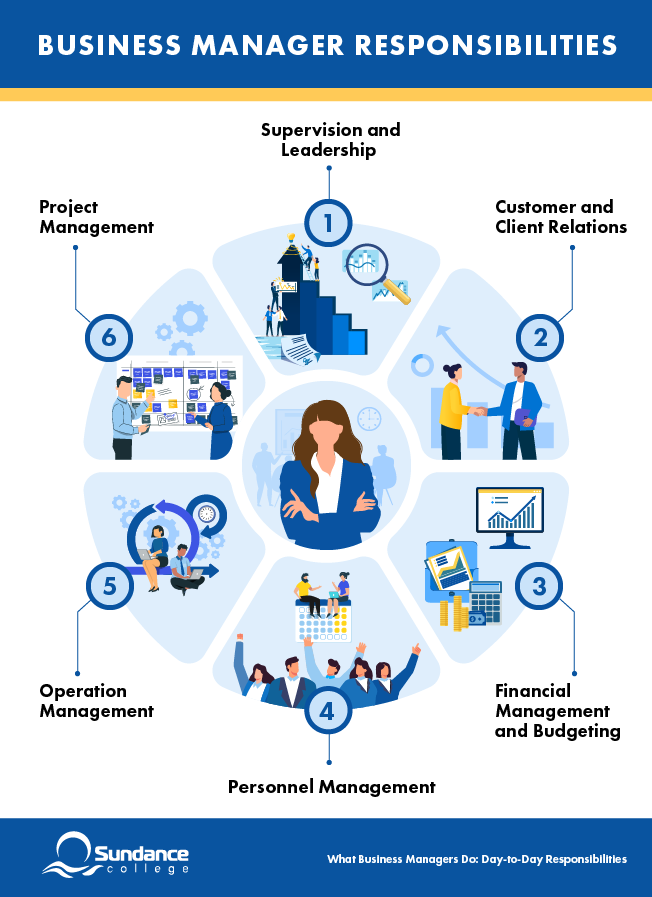Blog / What Business Managers Do: Day-to-Day Responsibilities
What Business Managers Do: Day-to-Day Responsibilities

General Business Management Diploma
- Entrepreneurship
- Administrative Assistant
- Retail Store Supervisor
- General Business Administration
Table of Contents
The success of a business can often depend on how well a manager performs their business management duties. From assisting with daily workflows to helping lead smaller teams, a business manager’s role can vary depending on the size and needs of the organization, as well as their experience level. When done effectively, these business managers help keep things organized and aligned with company goals. Poor management, however, can result in missed opportunities and disorganization.
Business managers typically work in areas from entry-level to mid-level positions, often serving as a bridge between senior executives and staff. The versatility of their role and the scope of their knowledge make them valuable across industries – from small businesses to large corporations. With the right education, their skill set enables them to adapt seamlessly across different businesses and effectively support operations in a wide range of work environments.
Listen to: ‘Business Manager Responsibilities: What Do They Do?
Responsibilities of a Business Manager

Being in a business management role like an office manager, assistant manager, retail manager, sales supervisor, administrative manager, or customer service manager, means you can pursue a career in a wide variety of industries and handle a range of tasks that contribute to a company’s success. Let’s take a closer look at the key business manager’s duties and responsibilities.
Supervision and Leadership
Supervision and team leadership in business are crucial. At the early stages of their career, business managers may assist with overseeing smaller teams and helping senior management. They will help set daily priorities, monitor performance, provide feedback, and ensure that staff are equipped with the tools and resources they need to do their jobs well.
For example, imagine you’re a sales supervisor in an electronics store. Your team is underperforming, so you create a friendly competition to motivate the staff. By offering rewards for the highest sales, team morale improves, and performance increases.
Whether it’s tweaking workflows or removing obstacles, business managers are responsible for giving their teams the tools they need to be effective.
Customer and Client Relations
Business managers play a key role in client and customer relations management, making sure customer needs are met and issues are resolved quickly. This often involves addressing escalated concerns, gathering feedback, and working with teams to improve products or services.
Imagine you’re a manager in a retail store. A new product receives mixed reviews, with some customers reporting usability issues. You coordinate with the customer service team to offer help and address these concerns, turning dissatisfied customers into loyal ones by providing timely support.
By effectively addressing customer concerns and working with teams to implement feedback, business managers help maintain strong client relationships and improve overall customer satisfaction.
Financial Management and Budgeting

Another key responsibility for business managers is supporting the financial processes within a company. This can include assisting with budgeting, forecasting, and tracking expenses, often under the guidance of senior management. While senior management typically oversees major financial decisions, business managers may contribute by helping to implement cost-saving measures and monitor the efficient use of resources.
According to Sundance College’s Commerce: General Business Management diploma program instructor, Vinnie H., “You have to know all about being profitable… Being financially aware and managing costs is critical.”
Picture yourself as an administrative manager. You’re asked to help reduce office expenses. After reviewing current expenditures, you implement more cost-effective office supply ordering and streamline vendor contracts, which reduces overhead without sacrificing quality.
Managers assist in balancing the company’s financial needs with its long-term goals, supporting senior managers in setting realistic and flexible budgets that align with the organization’s objectives and promote sustainable growth.
Personnel Management
While business managers may collaborate with HR during hiring, their primary focus is managing staff once they are onboarded. This includes overseeing performance, organizing training, and planning growth opportunities. Managers conduct performance reviews, address concerns, and implement systems to support team development.
For example, imagine you’re a manager at a busy restaurant. You notice a high turnover due to poor scheduling and limited growth opportunities. You introduce a flexible scheduling system and mentorship opportunities, improving retention and morale.
Business managers maintain a productive workforce, taking a hands-on approach in smaller organizations and working with HR in larger companies to support employee development.
Day-to-Day Operations Management
Another major responsibility of business managers is the daily operational management of the business. They are tasked with making sure that everything runs without error, schedules are met, and problems are resolved promptly. They regularly check in with departments to monitor goals and find ways to improve efficiency. In larger companies, this may be done in collaboration with operations teams.
Managers also provide updates to senior leadership on team performance and operational issues. At different points in their careers, they help organize workflows and solve problems to keep business operations running efficiently.
Imagine you’re an office manager at a large company. You notice delays in paperwork are affecting client meetings. To address this, you streamline processes by improving communication between departments, automating repetitive tasks, and reallocating responsibilities. These changes result in faster paperwork processing, better coordination, and more timely client interactions.
Project Management
Business managers often lead smaller projects or assist senior managers with larger ones. Their responsibilities include defining project scope, assigning tasks, setting deadlines, and ensuring projects stay on budget and on time. They manage the teams involved and keep stakeholders informed of progress.
Key tasks for project management in business include creating project plans, assigning roles, monitoring progress, and making necessary adjustments to ensure successful project completion.
Let’s say, for example, you’re an operations manager at a corporate office. You’re tasked with coordinating the company’s relocation. To minimize downtime, you work with the IT team to set up systems in advance and stagger the move so departments can continue working during the transition.
You also make sure the project stays on budget by regularly updating senior management on costs and tracking spending. By managing resources effectively and solving logistical challenges, you keep the move on schedule and within financial limits.

How to Get Started as a Business Manager
The ability to support teams, assist with financial processes, and contribute to projects is fundamental to organizational efficiency and success. To excel in the role of a business manager requires a combination of practical experience and knowledge, which is why the right education plays a role in preparing future business leaders.
Sundance College’s Commerce: General Business Management (CGBM) diploma program equips graduates with the versatility to excel in a wide range of industries. Whether you’re pursuing a career in sales, administration, finance, marketing, human resources, or entrepreneurship, the skills and knowledge gained from the program enable you to navigate the complexities of modern businesses.
Instructor Vinnie H. highlights, “There are great career opportunities graduates can expect in this field. Being general business, it’s very diversified and it’s wonderful because you actually get to learn about the skills and techniques you need. You can look at marketing. You can also look at the business communications. You can look at project management. You can be all over the business field in North America or throughout the world because we also teach and lecture international business.”
The program not only offers a comprehensive curriculum, but the staff, instructors, and student services teams support students with personalized guidance and flexible learning options. Vinnie H. emphasizes, “We really care about student success…your success is my success.” With hands-on learning, a real-world practicum, and up to date industry knowledge, the program makes sure that students are well-prepared for a fulfilling and lengthy career in business management.
Contact us today to find out more about our Commerce: General Business Management diploma program and how it can get you started in the business world.
Related Blogs
Subscribe for more career advice
Blog Categories
Share on:
